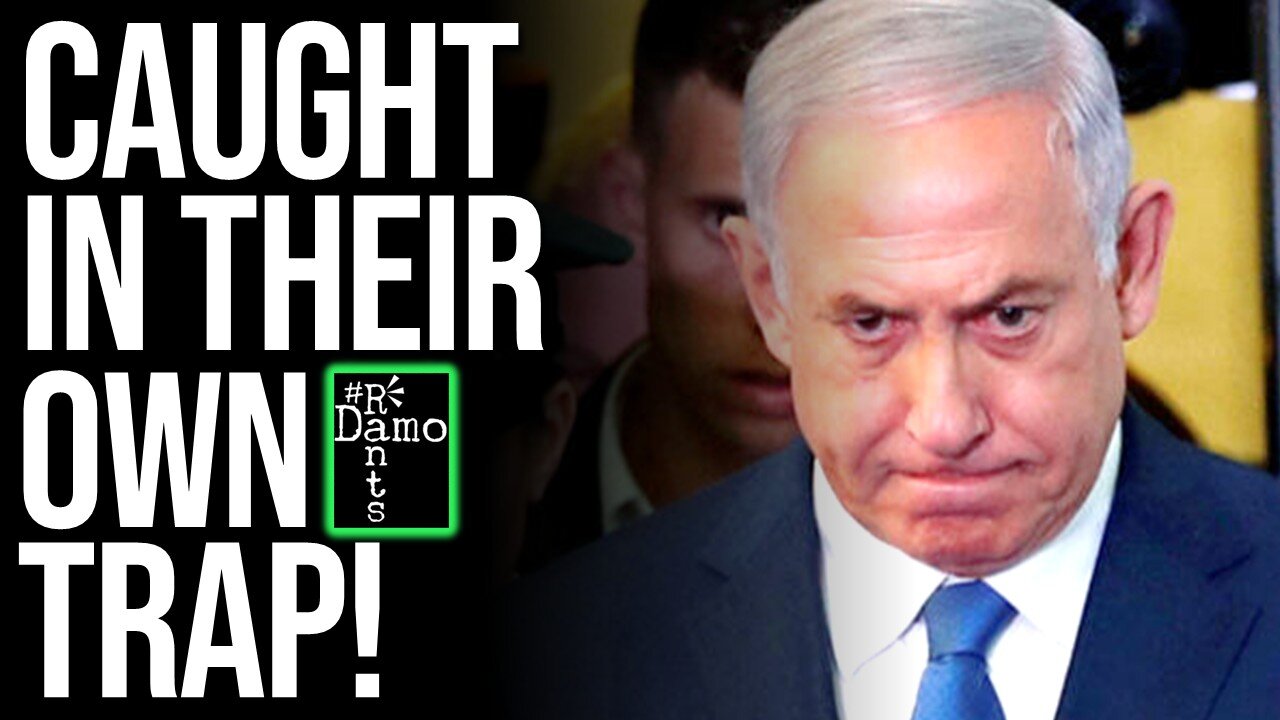Premium Only Content

Israel & the West Tried to Box Iran in - And Got Trapped Themselves!
Right, so Israel might have thought it had secured its energy future by tapping into Azerbaijan’s oil fields. A steady stream of Caspian crude, pumped through Turkey and shipped to Ashkelon, has become the lifeline for its economy and its warplanes. Alongside this, Donald Trump thought he had dealt Iran a massive humiliation with his grandiose Zangezur corridor brought around via mediation between Azerbaijan and Armenia, boxing Tehran out of the Caucasus and planting the NATO flag on its northern border so to speak. Meanwhile Turkiye’s hypocritical President Erdogan thought he could thunder against genocide in Gaza, compare Benjamin Netanyahu to Hitler, while quietly pocketing the profits from every barrel of oil that flowed from Azerbaijan, that he delivered to Israeli shores, on its way to fuel the very jets bombing Palestinian civilians. And Ilham Aliyev, Azerbaijan’s President, thought he could play all sides at once — feeding Israel oil, arming his army with Israeli drones, and yet now here he is, apparently about to start pumping Russian gas straight into Iran.
The corridors, pipelines, and partnerships built to bypass Iran have ended up binding it into the region more tightly than ever. Israel’s crude lifeline has become Iran’s gas lifeline. Trump’s corridor box has collapsed in on itself. Erdogan’s Gaza theatrics have been exposed as grotesque complicity. And Aliyev’s double game has left him feeding both sides in a conflict that was meant to corner only one and yet its still working for him.
What was supposed to be Iran’s greatest weakness has become its hidden strength. Iran was meant to be isolated, but the more its enemies try to choke Tehran, the more they’ve ended up choking themselves.
Right, so for decades, Israel and the United States have fantasised about cutting Iran out of the Caucasus. Pipelines were built to bypass it, alliances stitched together to surround it, and corridors proposed to sever it from Armenia. Isolating Iran, sanctioning them into the ground, attempting to cut off trade, strangle their economy was the name of the game. The boldest of these in recent weeks of course has been Donald Trump’s revival of the Zangezur corridor — marketed as a masterstroke of regional integration, but in reality was a blatant ploy to put a NATO-backed land bridge on Iran’s northern border. Trump bragged that Iran was boxed in and I did a video the other day implying that it wasn’t quite true, deals with Armenia and Pakistan ensuring that at least in part. But history has a way of making braggarts eat their words as well and the latest set of events very much bear that out.
Even as Trump sold his corridor as that Iranian defeat, Tehran was quietly pulled off another reversal. By securing a gas deal with Russia routed through Azerbaijan, Iran is turning the very infrastructure designed to feed Israel into a lifeline of its own. The Azerbaijani transit system that pumps crude westwards to Israel now also carries Russian gas southwards into Iran. The same network that was meant to strangle Tehran is helping it breathe.
Iran is therefore managing to using its enemies’ weight against them. It’s like political judo. But it raises questions that cut to the heart of the region’s contradictions, because I’m sure you’re asking questions about who is allied and owes allegiance to who here now: how did Azerbaijan become Israel’s oil lifeline? Why does Iran back Armenia yet do deals with Azerbaijan? What exactly was Trump’s corridor meant to achieve? How did Tehran flip all of this back in its favour? Why does President Aliyev risk playing both sides and why is Iran dealing with a nation so overtly supplying Israel to meet its energy interests? Could this uneasy arrangement destabilise Israel’s own lifeline now? And what does it mean for Europe, for Erdogan’s Turkey, and for Israel’s covert presence in the region?
Well lets start with Israel’s dependence on Azerbaijani oil. Since 2006, the BP-operated Baku–Tbilisi–Ceyhan pipeline has carried Caspian crude westward across Georgia to Turkey’s port of Ceyhan. From there, tankers ferry it to Israel’s Ashkelon terminal. Year after year, roughly thirty to forty percent of Israel’s crude oil — sometimes even more — originates from Azerbaijan. Erdogan himself once crowed that the BTC delivered around forty percent of Israel’s crude imports, yet we’re supposed to believe him when he says he stands up for Palestine.
Israel’s energy reliance on a small, distant state might seem precarious, but it comes with political payoffs. Azerbaijan is not just a supplier. It is a customer for Israeli weapons too. The Associated Press reported in 2020 that Israeli drones and loitering munitions were decisive in Azerbaijan’s lightning victory over Armenia in Nagorno-Karabakh. Turkish Bayraktar drones took headlines, but Israeli Harop and SkyStriker systems shredded Armenian defences and allowed Baku to reclaim territory. Without them, Azerbaijan’s triumph would have been slower, costlier, perhaps even uncertain.
This exchange of oil for arms cemented an axis. Israel keeps its jets flying with Azerbaijani crude. Azerbaijan keeps its flag flying over conquered territory with Israeli drones. Iran, watching from the south, sees a nightmare you would think and you’d be right actually: a hostile neighbour doubling as Israel’s gas station and weapons depot. Yet this nightmare is not the whole truth, because Azerbaijan’s interests are far more transactional than ideological.
Iran’s closest partner in the Caucasus has long been Armenia and you might think this a strange mix. This alliance defies surface logic — Armenia is Christian, Iran is Shia — but it makes perfect strategic sense. Armenia blocks a continuous Turkic corridor stretching from the Caspian to the Mediterranean. Iran, in turn, offers Armenia access to markets and energy when Turkey and Azerbaijan keep their borders shut to them.
The Zangezur corridor threatened to tear this balance apart. Trump presented it as “integration,” but for Tehran it was an existential threat. The corridor would cut Iran out of regional transit revenues and, far worse, create a NATO-friendly land bridge running across its northern border. If American troops ever piggybacked on it, Iran would face a direct Western presence a few kilometres away.
The grotesque overreach of Trump’s scheme was its boastful simplicity: that by carving through Syunik province in Armedia, linking Azerbaijan up to its exclave of Nakhchivan, Iran could be boxed out of the Caucasus forever. But what Trump sold as a box turned out to be a trap of his own making. For even as he boasted, Tehran was already working on a countermove. They play chess you see, Trump can barely manage a round of snakes and ladders.
You see, Iran and Russia have announced a deal that has come as a bit of a surprise. Moscow would supply Tehran with gas via Azerbaijan’s pipelines. What began as whispers of a swap became confirmed reports: 1.8 billion cubic metres annually to start, with plans reaching fifty-five billion over the long term. The very pipelines built to carry oil westwards to Israel would now carry gas southwards into Iran.
But that brings us back to something we still haven’t yet answered: why would Iran do this deal via the same nation that supplies Israel with so much of its crude, given what Israel are doing with it? The answer lies in opportunism. Russia, cut off from European markets, sanctioned, needed new outlets. Azerbaijan, eager to prove itself indispensable in the region even more, it’s all a calculation in self preservation, offered transit. Iran, desperate for energy security and sanctions relief, in many ways in much the same boat as Russia, seized the chance.
Israel’s artery has therefore become Iran’s drip feed. NATO’s pipeline has become Moscow’s back door. What was meant to bypass Tehran now props it up. Trump’s box has therefore imploded.
Why would Azerbaijan, Israel’s oil lifeline and weapons partner, agree to feed Iran with Russian gas? The answer is survival. Aliyev may posture as Israel’s ally, but he cannot afford to go all in against Iran. Tehran could stir unrest among the fifteen to twenty million ethnic Azeris living inside Iran, destabilising Baku overnight. Russia could rearm Armenia if provoked, the issue of Ukraine aside, undoing Azerbaijan’s battlefield gains. Even Turkey, its closest ally, prioritises profit over principle. Ankara makes money from every barrel of Azerbaijani crude passing through Ceyhan — including the oil that fuels Israel’s jets. And while it does not earn directly from Russian gas flowing south into Iran, it turns a blind eye, because what matters most to Erdogan is keeping Azerbaijan’s pipelines full and Turkey’s status as an indispensable energy corridor and Israel’s oil delivery boy status intact.
So Aliyev hedges. He supplies oil to Israel for hard currency and weapons. He supplies transit to Iran to placate Russia and avoid Tehran’s wrath. In effect, he is feeding both Israel and Iran at once, he is playing both sides and both sides accept it, because they have to. The image is absurd: one hand passing crude to Tel Aviv, the other hand pumping gas to Tehran. But absurdity is survival. By keeping both sides dependent, Aliyev keeps his own regime indispensable.
Aliyev’s double game is not just geopolitics; it is regime survival. The Aliyev dynasty has ruled Azerbaijan for decades by presenting itself as both modernising and nationalist. Victory over Armenia in 2020 and 2023 bolstered Aliyev’s legitimacy, but it also raised expectations. To maintain his grip, he must deliver economic growth, weapons superiority, and regional relevance.
Cutting off Israel would mean losing the advanced drones and missile systems that keep Azerbaijan ahead of Armenia. Cutting off Iran would mean risking retaliation, unrest among Azeris across the border, and Russian displeasure. Neither option is viable domestically. Thus, balancing foreign powers is not a luxury but a necessity for Aliyev’s authoritarian system. His double-dealing is the oxygen of his rule.
If Aliyev is a juggler, Erdogan is a hypocrite. He thunders against Israel, calling its war in Gaza a genocide, comparing Netanyahu to Hitler, painting himself as Palestine’s champion. And yet, the very pipeline that sustains Israel’s jets runs through Turkey. The BTC crosses Turkish soil to Ceyhan, where tankers depart for Ashkelon. Erdogan has even boasted of this achievement, hailing BTC as a triumph of Turkish–Azerbaijani partnership.
That hypocrisy is grotesque. The man who styles himself the voice of Gaza profits from the oil that fuels the very warplanes bombing Gaza’s ruins. His own ports profit from every barrel shipped. For Iran, however, this hypocrisy is useful. So long as Erdogan keeps the BTC open — and he must, for Turkey profits from every barrel — Tehran has cover to run its gas swaps through the same infrastructure. Erdogan’s theatrics shield a quiet reality: Turkey is both Israel’s supplier and Iran’s enabler.
Erdogan’s duplicity is partly explained by domestic politics. Within Turkey, the electorate is overwhelmingly pro-Palestinian. Erdogan’s Islamist base expects fiery denunciations of Israel. His nationalist supporters expect Turkey to stand tall against Western double standards. But Turkey’s economy relies on being an energy hub, collecting transit fees from every barrel and cubic metre that crosses its territory. Erdogan cannot afford to sacrifice Turkey’s central role in the pipeline game, but for those of us aware of this, its why so many have such a dim view of Erdogan himself.
Thus, his anti-Israel rhetoric functions as a pressure valve. He can rail against genocide on television while keeping the oil flowing quietly beneath the surface. It is political theatre designed to pacify his base while satisfying Turkey’s economic needs, God forbid he consider other more ethical options. Turkey isn’t sanctioned, they have options that arguably Russia and Iran don’t.
Israel’s relationship with Azerbaijan is not only economic and military but also covert. Multiple reports suggest that Israeli intelligence has used Azerbaijani territory to monitor, and possibly even stage operations against Iran, something Iran must be aware of via these gas supply lines I would imagine. From assassinations of nuclear scientists to cyber intrusions, Mossad benefits from having a partner perched on Iran’s northern border.
Baku tolerates this presence for the same reason it tolerates gas swaps with Iran: it wants to be indispensable. Hosting Mossad provides access to Israeli intelligence and weaponry. At the same time, allowing Russian gas to flow to Iran via its pipelines prevents Tehran from retaliating too hard. Aliyev calculates that as long as he plays both sides, neither will move to unseat him. But it is a dangerous gamble, and one that could backfire spectacularly if either Israel or Iran decides the double game has gone too far.
Europe enters this story as the unintended victim. Brussels has poured billions into pipelines like BTC and the Southern Gas Corridor to reduce dependence on Russian energy. Azerbaijan is celebrated in Europe as a clean alternative to Gazprom. But if those same pipelines are now being used to channel Russian gas into Iran, the entire premise of diversification collapses.
Iran and Russia have effectively hijacked NATO’s corridor. Instead of isolating Tehran, Europe’s infrastructure now sustains it. Instead of cutting Moscow off, it gives Russia a new outlet. For Brussels, this is actually something of a strategic embarrassment. For Tehran, it is vindication. The West’s encirclement tools have become Iran’s lifelines.
This double game cannot go unnoticed forever. Israel relies on Azerbaijan for nearly half its oil, but Azerbaijan is simultaneously feeding Iran gas, or will be very soon. If Tel Aviv or Washington push too hard, Aliyev could end up being made to face a stark choice. And even if they stay silent, civil society may not. In 2024, victims of Israel’s war on Gaza launched legal action against BP, arguing that oil supplied through BTC made the company complicit in war crimes. The case highlighted that at least twenty-eight percent of Israel’s crude came via that pipeline. If BP can be targeted, so can Baku.
Here lies Tehran’s quiet victory. Iran does not need to bomb the pipeline or sever Israel’s artery. It only needs to make it fragile, morally indefensible, and politically costly. With every lawsuit, every exposé, and every revelation that Azerbaijan is also transiting Russian gas to Iran, Israel’s lifeline looks less like security and more like a liability.
Iran’s strategy here is consistent with its history. For decades, under sanctions, it has survived not by open confrontation but by exploiting contradictions. In the 1980s, it played the United States and Israel off against Iraq. In the 2000s, it used Turkey’s trade routes to bypass sanctions even as Ankara postured as a NATO member. Today, it uses Azerbaijan’s pipelines to sustain itself even as Baku fuels Israel.
Political martial arts: never meeting force with force, but redirecting it. Iran turns sanctions into opportunities, encirclement into entanglement, lifelines into leverage. Its enemies find themselves trapped not by Iran’s strength but by their own contradictions.
But such a balance cannot last forever. If Washington or Tel Aviv decide to force Azerbaijan to choose, the consequences will be destabilising. If Baku cuts Iran off, Tehran could retaliate by stirring unrest among Azeris in northern Iran or backing Armenian revanchism. If Baku cuts Israel off, it risks losing Israeli weapons and American favour, undermining its military edge. Either choice could destabilise Aliyev’s regime.
Alternatively, civil society pressure could escalate. If more lawsuits target Western firms supplying Israel via BTC, political pressure may mount on Baku. Erdogan’s duplicity may also face limits. If Turkish voters demand action to match his words, Ankara could be forced into awkward decisions about its pipelines. In all scenarios, Iran benefits from the instability. The more fragile Israel’s lifeline becomes, the stronger Tehran looks by comparison.
Trump’s corridor was meant to cut Iran out — instead, it forced Tehran to embed itself deeper. Azerbaijan was meant to be Israel’s unshakable partner — instead, it feeds both Tel Aviv and Tehran now. Erdogan was meant to be Gaza’s loudest defender — instead, he bankrolls Israel’s oil lifeline. In every case, encirclement has backfired. The box has imploded. The trap has sprung on its own architects and Iran is still standing.
Iran’s strategy is not one of overwhelming strength but of resilience and exploitation. It thrives on hypocrisy. It turns enemies’ contradictions into its lifelines. It drinks from Israel’s straw if you like, uses NATO’s corridor, and watches as its adversaries entangle themselves.
Iran was supposed to be cornered. Instead, it has made itself indispensable. Azerbaijan supplies Israel’s oil, but it also sustains Iran’s gas. Erdogan shouts about genocide, but his pipelines keep Israel’s warplanes airborne. Trump boasted of a corridor to box Tehran in and lock them down, but Tehran climbed inside his box and ran away with the keys.
This is the paradox the West and Israel cannot admit to: every attempt to isolate Iran ends up binding it tighter into the region. Israel’s lifeline has become Iran’s survival line. Erdogan’s hypocrisy has become Tehran’s shield. Trump’s corridor has become Washington’s own trap. Far from being crushed, Iran has turned encirclement into leverage. The more its enemies try to cut it out, the more they end up cutting themselves in.
Iran is their unwanted winner of the Caucasus energy game. And unless its adversaries accept that reality, they will keep finding their lifelines imploding in their own hands.
And of course for as much as this is economic warfare you might say, the more overt military kind is still being spread by Israel, with rhetoric being made against Iran, but also their allies the Houthis in Yemen, as Israeli defence minister Israel Katz has gone all biblical on them by threatening Yemen with a ‘plague of the firstborn,’ which, unfortunately for him, is being seen as an overt threat against children, and given how many have died in Gaza, the population of the Strip, being half composed of children itself, just lends credence to that line of thinking. Are the Houthis scared though? Not a bit of it. Get all the details of their retaliation in this video recommendation here as your suggested next watch.
Please do also hit like, share and subscribe if you haven’t done so already so as to ensure you don’t miss out on all new daily content as well as spreading the word and helping to support the channel at the same time which is very much appreciated, holding power to account for ordinary working class people and I will hopefully catch you on the next vid. Cheers folks.
-
 1:21:43
1:21:43
Jake Shields' Fight Back Podcast
11 hours agoJake Shields and Paul Miller!
43.5K81 -
 1:20:41
1:20:41
TRAGIKxGHOST
2 hours agoTrying to get SCARED tonight! | Are You SCARED!? | Screams Beyond Midnight | Grab a Snack
6.17K2 -
 LIVE
LIVE
StuffCentral
4 hours agoI'm baaack (no you can't play with me.. unless you a healer)
109 watching -
 2:25:11
2:25:11
TheSaltyCracker
5 hours agoTrump Is Not Dead ReEEeStream 8-31-25
70.9K108 -
 3:09:16
3:09:16
THOUGHTCAST With Jeff D.
3 hours ago $0.67 earnedLabor Day Weekend FORTNITE With THOUGHTCAST Jeff & the squad
11.7K4 -
 3:44:05
3:44:05
Rallied
6 hours ago $4.00 earnedSolo Challenges All Day
40.5K1 -
 LIVE
LIVE
iCheapshot
6 hours ago $0.20 earnedCall of Duty: Black Ops Campaign
46 watching -
 4:39:16
4:39:16
Meisters of Madness
7 hours agoMadness in a Pod
7.59K1 -
 1:25:44
1:25:44
HELMETFIRE
4 hours ago🟢GAMING WITH FIRE EP9🟢
7.91K -
 1:24:08
1:24:08
Jean-Claude@BeyondMystic
15 hours ago🌀 THE WACKY WOO SHOW 3I ATLAS ALIEN INVASION with DICK ALLGIRE & JC - AUG 31 , 20254
47.4K64